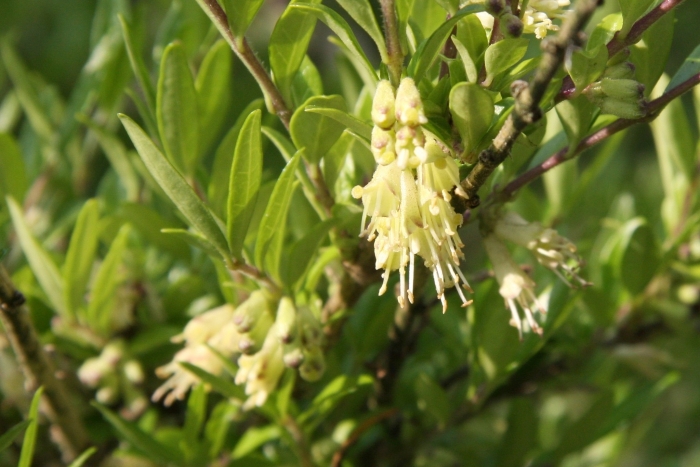Privet Honeysuckle
(Lonicera pileata)
Privet Honeysuckle (Lonicera pileata)
/
/

Maja Dumat
CC BY 2.0
Image By:
Maja Dumat
Recorded By:
Copyright:
CC BY 2.0
Copyright Notice:
Photo by: Maja Dumat | License Type: CC BY 2.0 | License URL: https://creativecommons.org/licenses/by/2.0/ | Uploader: blumenbiene | Publisher: Flickr |






















Estimated Native Range
Summary
Lonicera pileata, commonly known as Privet Honeysuckle, is an evergreen shrub native to forest margins, scrublands, and rocky slopes in South Central and Southwest China. It typically grows to a height of 5-8 feet (1.5-2.4 meters) and a width of 4-7 feet (1.2-2.1 meters), with a dense, spreading habit. The plant features small, glossy, ovate leaves and produces inconspicuous creamy-white flowers in late spring, followed by purple-black berries that are attractive to birds.
Privet Honeysuckle is valued for its low-maintenance nature and its ability to form dense ground cover, making it suitable for use in urban landscapes, as a border planting, or for erosion control on slopes. It thrives in a range of light conditions, from full sun to partial shade, and is adaptable to various soil types, provided they are well-drained. While it is drought-tolerant once established, regular watering during the first growing season will help to ensure a strong root system. Gardeners should be aware that in some regions, Lonicera pileata can spread aggressively and may require pruning to keep it in check. It is also susceptible to aphids and powdery mildew, which should be monitored and managed as needed.CC BY-SA 4.0
Privet Honeysuckle is valued for its low-maintenance nature and its ability to form dense ground cover, making it suitable for use in urban landscapes, as a border planting, or for erosion control on slopes. It thrives in a range of light conditions, from full sun to partial shade, and is adaptable to various soil types, provided they are well-drained. While it is drought-tolerant once established, regular watering during the first growing season will help to ensure a strong root system. Gardeners should be aware that in some regions, Lonicera pileata can spread aggressively and may require pruning to keep it in check. It is also susceptible to aphids and powdery mildew, which should be monitored and managed as needed.CC BY-SA 4.0
Plant Description
- Plant Type: Shrub
- Height: 2-3 feet
- Width: 4-7 feet
- Growth Rate: Moderate
- Flower Color: N/A
- Flowering Season: Spring, Summer
- Leaf Retention: Evergreen
Growth Requirements
- Sun: Full Sun, Part Shade
- Water: Low, Medium
- Drainage: Slow, Medium, Fast
Common Uses
Bank Stabilization, Bee Garden, Bird Garden, Border Plant, Deer Resistant, Drought Tolerant, Erosion Control, Groundcover, Hedges, Low Maintenance
Natural Habitat
Forest margins, scrublands, and rocky slopes in South Central and Southwest China
Other Names
Common Names: Box-Leaf Honeysuckle, Immergrüne Kriech-Heckenkirsche, Clématite À Cupule, Lingontry
Scientific Names: , Lonicera pileata, Lonicera ligustrina subsp. pileata, Lonicera ligustrina var. pileata, Caprifolium pileatum,
GBIF Accepted Name: Lonicera pileata Oliv.